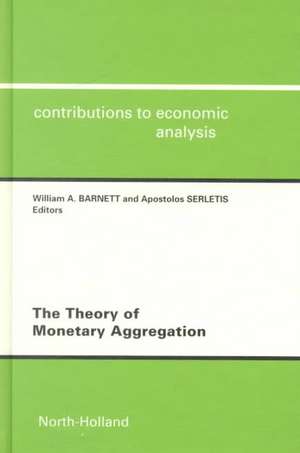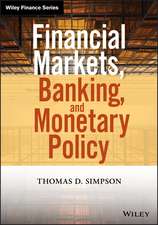The Theory of Monetary Aggregation: Contributions to Economic Analysis, cartea 245
Autor W. a. Barnett, A. Serletis, Harold Ed. Draperen Limba Engleză Hardback – 29 iun 2000
William Barnett, the coeditor of this volume, introduced modern economic index number theory into monetary economics. His merger of economic index number theory, with monetary theory was based upon the use of Diewert's approach to producing "superlative" nonparametric approximations to the theoretically exact aggregator functions. This book comprises a focussed and unified collection of Barnett's most important publications in this area.
The papers in the book have been organized into logical sections, with unifying introductions and overviews. The result is a systematic development of the state of the art in monetary and financial aggregation theory. The sections cover the origin of the user cost price of monetary services. Exact aggregation of monetary assets on the demand side for consumers and firms, and on the supply side for financial intermediaries, general equilibrium of all economic agents' demands and supplies, dynamic solution of the exact system, and extension to monetary aggregation under risk. The extension of index number theory to the case of risk is completely general, and can be applied to tracking any exact economic aggregator under risk. In all cases, the criterion used for evaluation is the tracking ability of the approximation to the exact aggregator function of economic theory.
Many of the empirical and policy puzzles in monetary economics disappear when simple sum monetary aggregates are replaced by index numbers that are coherent with theory. Simple sum monetary aggregates became incoherent with theory, when monetary assets began paying interest and therefore could no longer be viewed as perfect substitutes.
This is a useful tool to those associated with economics departments within universities, business schools, central banks and federal governments, financial institutions including underwriters, bankers and stockbrokers.
Din seria Contributions to Economic Analysis
- 9%
 Preț: 802.39 lei
Preț: 802.39 lei - 23%
 Preț: 1071.35 lei
Preț: 1071.35 lei - 23%
 Preț: 1023.59 lei
Preț: 1023.59 lei - 23%
 Preț: 932.12 lei
Preț: 932.12 lei - 23%
 Preț: 1258.06 lei
Preț: 1258.06 lei - 23%
 Preț: 1125.47 lei
Preț: 1125.47 lei - 23%
 Preț: 1072.71 lei
Preț: 1072.71 lei - 23%
 Preț: 1134.25 lei
Preț: 1134.25 lei - 23%
 Preț: 1025.01 lei
Preț: 1025.01 lei - 23%
 Preț: 928.43 lei
Preț: 928.43 lei - 23%
 Preț: 1327.58 lei
Preț: 1327.58 lei - 23%
 Preț: 1090.22 lei
Preț: 1090.22 lei - 23%
 Preț: 1196.60 lei
Preț: 1196.60 lei - 23%
 Preț: 928.84 lei
Preț: 928.84 lei - 23%
 Preț: 1061.82 lei
Preț: 1061.82 lei - 23%
 Preț: 1113.58 lei
Preț: 1113.58 lei - 23%
 Preț: 874.46 lei
Preț: 874.46 lei - 19%
 Preț: 673.76 lei
Preț: 673.76 lei -
 Preț: 333.43 lei
Preț: 333.43 lei - 23%
 Preț: 1264.34 lei
Preț: 1264.34 lei - 23%
 Preț: 1323.45 lei
Preț: 1323.45 lei - 23%
 Preț: 1261.24 lei
Preț: 1261.24 lei - 23%
 Preț: 1099.44 lei
Preț: 1099.44 lei - 23%
 Preț: 1149.25 lei
Preț: 1149.25 lei - 23%
 Preț: 836.47 lei
Preț: 836.47 lei - 23%
 Preț: 854.99 lei
Preț: 854.99 lei - 23%
 Preț: 1125.37 lei
Preț: 1125.37 lei - 23%
 Preț: 932.57 lei
Preț: 932.57 lei - 23%
 Preț: 1266.20 lei
Preț: 1266.20 lei - 23%
 Preț: 1018.90 lei
Preț: 1018.90 lei - 23%
 Preț: 1204.17 lei
Preț: 1204.17 lei - 23%
 Preț: 1398.42 lei
Preț: 1398.42 lei - 23%
 Preț: 1221.55 lei
Preț: 1221.55 lei - 23%
 Preț: 1134.89 lei
Preț: 1134.89 lei - 23%
 Preț: 928.43 lei
Preț: 928.43 lei - 23%
 Preț: 930.35 lei
Preț: 930.35 lei - 23%
 Preț: 1028.12 lei
Preț: 1028.12 lei - 23%
 Preț: 895.88 lei
Preț: 895.88 lei - 23%
 Preț: 1096.14 lei
Preț: 1096.14 lei - 23%
 Preț: 999.71 lei
Preț: 999.71 lei - 23%
 Preț: 1052.38 lei
Preț: 1052.38 lei - 23%
 Preț: 1045.56 lei
Preț: 1045.56 lei - 23%
 Preț: 1255.61 lei
Preț: 1255.61 lei - 23%
 Preț: 1076.51 lei
Preț: 1076.51 lei - 23%
 Preț: 1042.59 lei
Preț: 1042.59 lei
Preț: 1299.72 lei
Preț vechi: 1687.95 lei
-23% Nou
Puncte Express: 1950
Preț estimativ în valută:
248.70€ • 260.32$ • 206.100£
248.70€ • 260.32$ • 206.100£
Carte tipărită la comandă
Livrare economică 31 martie-14 aprilie
Preluare comenzi: 021 569.72.76
Specificații
ISBN-13: 9780444501196
ISBN-10: 0444501193
Pagini: 712
Dimensiuni: 156 x 234 x 38 mm
Greutate: 1.17 kg
Ediția:New.
Editura: Emerald Group Publishing Limited
Seria Contributions to Economic Analysis
ISBN-10: 0444501193
Pagini: 712
Dimensiuni: 156 x 234 x 38 mm
Greutate: 1.17 kg
Ediția:New.
Editura: Emerald Group Publishing Limited
Seria Contributions to Economic Analysis
Cuprins
Preface. Editors' Introduction.
Part I: Monetary Index Number Theory and the Price of Money.
Section 1.1: Editors' Overview of Part I (W.A. Barnett, A. Serletis).
Section 1.2: Derivation of the User Cost of Monetary Services.
Section 1.3: The Price of Monetary Services and Its Use in Monetary Index Number Theory.
Part 2: Index Number Theory. Section 2.1: Editors' Overview of Part 2 (W.A. Barnett, A. Serletis). Section 2.2: General Index Number Theory.
Section 2.3: Monetary Index Number Theory.
Part 3: Extensions of Index Number Theory. Section 3.1: Editors' Overview of Part 3 (W.A. Barnett, A. Serletis). Section 3.2: Extensions to Second Moments.
Section 3.3: Extensions to Risk.
Section 3.3.1. Monetary Aggregation Theory Under Risk.
Section 3.3.2 Monetary Index Number Theory Under Risk.
Section 3.4: Extensions to Capitalized Money Stock Aggregation.
Part 4: Consumer Monetary Aggregation Under Perfect Certainty.
Section 4.1: Editors' Overview of Part 4 (W.A. Barnett, A. Serletis).
Section 4.2: General Index Number Theory.
Part 5: Demand and Supply Side Monetary Aggregation by Firms and Financial Intermediaries.
Section 5.1: Editors' Overview of Part 5 (W.A. Barnett, A. Serletis).
Section 5.2: Production and Supply Side.
Section 5.3: Extensions to Risk.
Part 6: Monetary Policy with Exact Monetary Aggregation.
Section 6.1: Editors' Overview of Part 6 (W.A. Barnett, A. Serletis).
Section 6.2: Monetary Policy.
Section 6.3: Macroeconomic Policy.
Data Appendix.
Section A.1: Editors' overview of appendix (W.A. Barnett, A. Serletis).
Section A.2: St. Louis Federal Reserve Bank data.
Appendix A. Consolidated references. Index by name. Index by subject.
Part I: Monetary Index Number Theory and the Price of Money.
Section 1.1: Editors' Overview of Part I (W.A. Barnett, A. Serletis).
Section 1.2: Derivation of the User Cost of Monetary Services.
Section 1.3: The Price of Monetary Services and Its Use in Monetary Index Number Theory.
Part 2: Index Number Theory. Section 2.1: Editors' Overview of Part 2 (W.A. Barnett, A. Serletis). Section 2.2: General Index Number Theory.
Section 2.3: Monetary Index Number Theory.
Part 3: Extensions of Index Number Theory. Section 3.1: Editors' Overview of Part 3 (W.A. Barnett, A. Serletis). Section 3.2: Extensions to Second Moments.
Section 3.3: Extensions to Risk.
Section 3.3.1. Monetary Aggregation Theory Under Risk.
Section 3.3.2 Monetary Index Number Theory Under Risk.
Section 3.4: Extensions to Capitalized Money Stock Aggregation.
Part 4: Consumer Monetary Aggregation Under Perfect Certainty.
Section 4.1: Editors' Overview of Part 4 (W.A. Barnett, A. Serletis).
Section 4.2: General Index Number Theory.
Part 5: Demand and Supply Side Monetary Aggregation by Firms and Financial Intermediaries.
Section 5.1: Editors' Overview of Part 5 (W.A. Barnett, A. Serletis).
Section 5.2: Production and Supply Side.
Section 5.3: Extensions to Risk.
Part 6: Monetary Policy with Exact Monetary Aggregation.
Section 6.1: Editors' Overview of Part 6 (W.A. Barnett, A. Serletis).
Section 6.2: Monetary Policy.
Section 6.3: Macroeconomic Policy.
Data Appendix.
Section A.1: Editors' overview of appendix (W.A. Barnett, A. Serletis).
Section A.2: St. Louis Federal Reserve Bank data.
Appendix A. Consolidated references. Index by name. Index by subject.
Recenzii
...Papers focus on monetary index number theory and the price of money; index number theory; extensions of index number theory; comsumer monetary aggregation under perfect certainty; demand and supply-side monetary aggregation by firms and financial intermediaries; and monetary policy with exact monetary aggregation.
Journal of Economic Literature, Vol. 39
...This book is a collection of works by William A. Barnett and his co-authors in the area of monetarry and financial aggregation theory.
Journal of Macroeconics
Journal of Economic Literature, Vol. 39
...This book is a collection of works by William A. Barnett and his co-authors in the area of monetarry and financial aggregation theory.
Journal of Macroeconics










